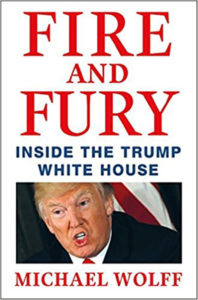
Fire and Fury: Inside the Trump White House Hardcover
Michael Wolff
Henry Holt & Co (2018)
Rs1,395
With extraordinary access to the West Wing, Michael Wolff reveals what happened behind-the-scenes in the first nine months of the most controversial presidency of our time in Fire and Fury: Inside the Trump White House.
Since Donald Trump was sworn in as the 45th President of the United States, the country?and the world?has witnessed a stormy, outrageous, and absolutely mesmerizing presidential term that reflects the volatility and fierceness of the man elected Commander-in-Chief.
This riveting and explosive account of Trump’s administration provides a wealth of new details about the chaos in the Oval Office, including:
— What President Trump’s staff really thinks of him
— What inspired Trump to claim he was wire-tapped by President Obama
— Why FBI director James Comey was really fired
— Why chief strategist Steve Bannon and Trump’s son-in-law Jared Kushner couldn’t be in the same room
— Who is really directing the Trump administration’s strategy in the wake of Bannon’s firing
— What the secret to communicating with Trump is
— What the Trump administration has in common with the movie The Producers
Never before in history has a presidency so divided the American people. Brilliantly reported and astoundingly fresh, Fire and Fury shows us how and why Donald Trump has become the king of discord and disunion.
Michael Wolff has received numerous awards for his work, including two National Magazine Awards. He has been a regular columnist for Vanity Fair, New York, The Hollywood Reporter, British GQ, USA Today, and The Guardian. He is the author of six prior books, including the bestselling Burn Rate and The Man Who Owns the News. He lives in Manhattan and has four children.
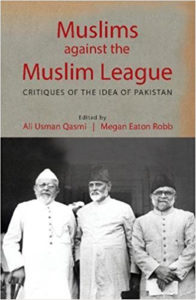
Muslims against the Muslim League: Critiques of the Idea of Pakistan
Ali Usman Qasmi
Cambridge Uni Press (2017)
Rs2,195
The popularity of the Muslim League and its idea of Pakistan has been measured in terms of its success in achieving the goal of a sovereign state in the Muslim majority regions of North West and North East India. It led to an oversight of Muslim leaders and organizations which were opposed to this demand, predicating their opposition to the League on its understanding of the history and ideological content of the Muslim nation. This volume takes stock of multiple narratives about Muslim identity formation in the context of debates about partition, historicizes those narratives, and reads them in the light of the larger political milieu of the period. Focusing on the critiques of the Muslim League, its concept of the Muslim nation, and the political settlement demanded on its behalf, it studies how the movement for Pakistan inspired a contentious, influential conversation on the definition of the Muslim nation.
Ali Usman Qasmi is Assistant Professor in the Department of History at the Lahore University of Management Sciences, Pakistan. He is the author of Questioning the Authority of the Past: The Ahl al-Qur’an Movements in the Punjab (2012) and The Ahmadis and the Politics of Religious Exclusion in Pakistan (2015).
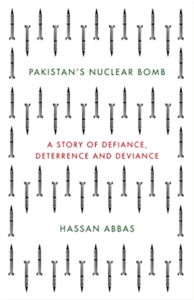
Pakistan’s Nuclear Bomb: A Story of Defiance, Deterrence and Deviance
Hassan Abbas
OUP (2018)
Rs1,395
This book provides a comprehensive account of the mysterious story of Pakistan’s attempt to develop nuclear weapons in the face of severe odds. Hassan Abbas profiles the politicians and scientists involved, and the role of China and Saudi Arabia in supporting Pakistan’s nuclear infrastructure.
Abbas also unravels the motivations behind the Pakistani nuclear physicist Dr A.Q. Khan’s involvement in nuclear proliferation in Iran, Libya and North Korea, drawing on extensive interviews. He argues that the origins and evolution of the Khan network were tied to the domestic and international political motivations underlying Pakistan’s nuclear weapons project, and that project’s organization, oversight and management. The ties between the making of the Pakistani bomb and the proliferation that then ensued have not yet been fully illuminated or understood, and this book’s disclosures have important lessons. The Khan proliferation breach remains of vital importance for understanding how to stop such transfers of sensitive technology in future.
Finally, the book examines the prospects for nuclear safety in Pakistan, considering both Pakistan’s nuclear control infrastructure and the threat posed by the Taliban and other extremist groups to the country’s nuclear assets.
Hassan Abbas is professor and chair of the department of regional and analytical studies at National Defense University, Washington, DC. His previous books include The Taliban Revival and Pakistan’s Drift into Extremism.
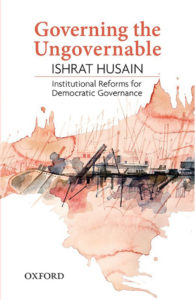
Governing the Ungovernable: Institutional Reforms for Democratic Governance
Ishrat Husain
OUP (2017), Rs995
Pakistan, since its independence in 1947, had to face tumultuous years for the first four decades. Despite the many challenges, both internal and external, the country was able to register a 6 percent average annual growth rate during the first forty years of its existence. The country was ahead of India and Bangladesh in all economic and social indicators. Since 1990, the country has fallen behind its neighbouring countries and has had a decline in the growth rate.
This book attempts to examine the reasons behind this slowdown, the volatile and inequitable growth of the last twenty-five years, and through a process of theoretical and empirical evidence argues that the most powerful explanatory hypothesis lies in the decay of institutions of governance. It also suggests a selective and incremental approach of restructuring some key public institutions that pertain to accountability, transparency, security, economic growth, and equity.
Dr Ishrat Husain is a former governor of the State Bank of Pakistan and served as Dean and Director of the IBA (Institute of Business Administration) (2008–16). He had a distinguished career at the World Bank for two decades (1979–99), and was a member of Mahathir Commission that developed Vision 2020 for the IDB. Husain is currently a member of the Middle East Advisory Group of the IMF; member, President Advisory Council of the IDB; Convener, Economic Advisory Council, Ministry of Finance; and Member, Advisory Council to the Minister for Planning, Development, and Reforms. A graduate of the Executive Development Program—jointly sponsored by Harvard, Stanford, and INSEAD—Husain was also Chairman, World Economic Forum Global Advisory Council on Pakistan (2014). Dr Husain has been conferred the Hilal-e-Imtiaz award (2003) and the highest civilian award, the Nishan-e-Pakistan (2016). His other publications include Pakistan: The Economy of an Elitist State and Economic Management in Pakistan 1999–2002 (OUP).
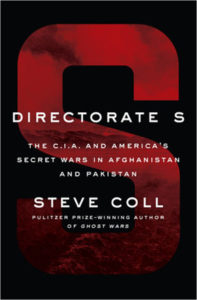
Directorate S: The CIA and America’s secret wars in Afghanistan and Pakistan
Steve Coll
Penguin Press (2018)
Rs1,795
Resuming the narrative of his Pulitzer Prize-winning Ghost Wars, bestselling author Steve Coll tells for the first time the epic and enthralling story of America’s intelligence, military, and diplomatic efforts to defeat Al Qaeda and the Taliban in Afghanistan and Pakistan since 9/11
Prior to 9/11, the United States had been carrying out small-scale covert operations in Afghanistan, ostensibly in cooperation, although often in direct opposition, with I.S.I., the Pakistani intelligence agency. While the US was trying to quell extremists, a highly secretive and compartmentalized wing of I.S.I., known as “Directorate S,” was covertly training, arming, and seeking to legitimize the Taliban, in order to enlarge Pakistan’s sphere of influence. After 9/11, when fifty-nine countries, led by the U. S., deployed troops or provided aid to Afghanistan in an effort to flush out the Taliban and Al Qaeda, the U.S. was set on an invisible slow-motion collision course with Pakistan.
Today we know that the war in Afghanistan would falter badly because of military hubris at the highest levels of the Pentagon, the drain on resources and provocation in the Muslim world caused by the U.S.-led invasion of Iraq, and corruption. But more than anything, as Coll makes painfully clear, the war in Afghanistan was doomed because of the failure of the United States to apprehend the motivations and intentions of I.S.I.’s “Directorate S”. This was a swirling and shadowy struggle of historic proportions, which endured over a decade and across both the Bush and Obama administrations, involving multiple secret intelligence agencies, a litany of incongruous strategies and tactics, and dozens of players, including some of the most prominent military and political figures. A sprawling American tragedy, the war was an open clash of arms but also a covert melee of ideas, secrets, and subterranean violence.
Coll excavates this grand battle, which took place away from the gaze of the American public. With unsurpassed expertise, original research, and attention to detail, he brings to life a narrative at once vast and intricate, local and global, propulsive and painstaking.
This is the definitive explanation of how America came to be so badly ensnared in an elaborate, factional, and seemingly interminable conflict in South Asia. Nothing less than a forensic examination of the personal and political forces that shape world history, Directorate S is a complete masterpiece of both investigative and narrative journalism.
Steve Coll is the author of the Pulitzer Prize-winning Ghost Wars and the dean of the Graduate School of Journalism at Columbia University, and from 2007 to 2013 was president of the New America Foundation, a public policy institute in Washington, D.C.

